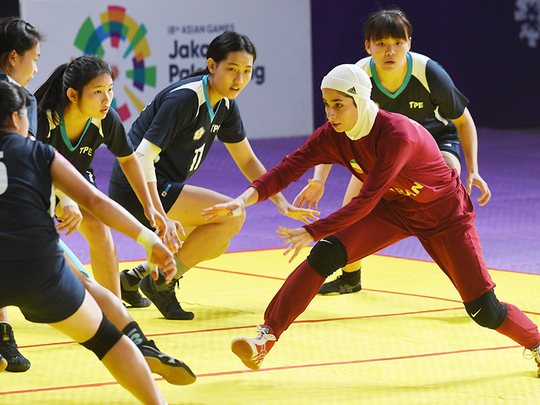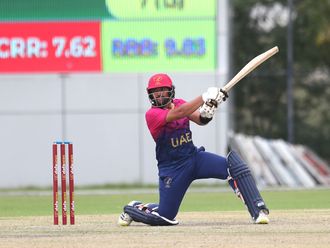
Jakarta: Kabaddi fans gasped when seven-time men’s champions India — whose country is widely seen as the sport’s birthplace — lost their first ever match at the Asian Games.
But India’s unlikely vanquishers, South Korea, are not the only country with growing ambitions in the tag-meets-rugby contact sport, reputedly rooted in ancient Hindu mythology.
Iran’s women’s coach doesn’t just want to wrestle the title from the defending champions. She wants to reclaim the sport itself, which she says in fact originated in her country.
“It is a big mistake! Kabaddi is not an Indian word, it is an Iranian word,” says Zahra Rahiminejad. “Kabaddi is part of the culture of Iran.”
“In my country, the game has been played for nearly 2,000 years. All of the people in Iran know it — mothers, grandmothers, children,” she adds.
Rahiminejad had just watched her team underline their title ambitions by hammering South Korea 46-20.
Teams collect points by sending a raider into enemy territory to tag an opponent before returning to safety. Traditionally, raiders chant “kabaddi, kabaddi” to prove they’re only using one breath.
Defending teams can also collect points by preventing the raider from escaping their half of the court, often with body-slamming tackles and vicious ankle-wrenches.
Iran’s ladies take a particularly no-holds-barred approach, tagging opponents with high kicks and celebrating each victory with a guttural group roar.
For a team that took bronze eight years ago, and silver at the last edition in 2014, the goal is clear.
“I don’t hope — I’m sure we will get the gold medal,” says a smiling Ghazal Khalaj, a 27-year-old personal trainer making her third Asian Games appearance.
“My team is very good and better than four years ago in Incheon.”
The coach’s claim about kabaddi’s origins comes from the fact that similar versions of the tag-style game have appeared throughout Asia over the centuries.
One popular version in parts of Iran involves shouting “zouuu zouuu”, rather than “kabaddi kabaddi”.
Indonesia’s Bali — a majority-Hindu island — has its own variant called “gala-gala”.
But the unified version being played in this Asian Games was codified by the India-based International Kabaddi Federation, which hopes to get the sport into the Olympics.
If Iran’s women are to triumph on the global stage, they will have to overcome more obstacles than just India’s formidable might.
The team have to contend with restrictions imposed by the country’s strict Islamic government — including wearing headscarves during play.
“It is difficult,” admits Rahiminejad. “But it is an old rule, a government rule. We know we must play while in international sports games, with this government hijab.”
While tackling players by grabbing their clothing is prohibited, it does still occur. During the last Asian Games kabaddi final, India’s women sportingly stopped play and shielded an Iranian athlete as she replaced her hijab, which had come loose during play.
And aside from the occasional international tournament, the Iranian women have no experience of playing in stadiums filled with male spectators, or journalists.
Japan’s women, also taking part in the Asian Games kabaddi tournament, had to overcome a different sort of challenge.
According to their coach, the country boasts only around 200 active players.
“I have much curiosity about it — I wanted to be a pioneer of a new sport in Japan,” says captain Yoko Ota, a 26-year-old office worker who started playing at university.
“In kabaddi we don’t have to use any equipment. With only my body, I can play kabaddi.”











